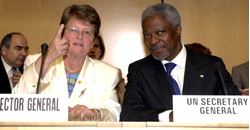In a speech to the World Health Assembly, Mr Annan said that in order to encourage development in many countries, the runaway contagion of HIV/AIDS, and other diseases must be contained.

"The devastation wrought by HIV/AIDS is now so acute that it has itself become one of the main obstacles to development," Mr Annan told the delegates of the World Health Organization’s 191 Member States who are meeting here this week.
He informed the Assembly that plans for the fund are progressing.
Mr Annan said that the fund should be governed by an independent board, made up of stakeholders including governments from both donor and developing countries, Non-governmental organizations, the private sector and the United Nations. The day-to-day running of the fund should be done through a small secretariat, which would draw on a technical advisory body made up of the best international experts in the fields of health and development.
"The broad policies would be set by the Board, which would use the money to support national programmes and strategies, decided by national leaders," he said. "But it would insist on transparency and accountability, so that we can be sure the money is being spent in ways that are effective, and is reaching the people who need it most."
Muting concerns that the proposed fund would pull money away from existing health programmes, Mr Annan stressed that the fund must be additional to existing funds and mechanisms, not just a new way of channelling money that is already earmarked for development.
Mr Annan reiterated his five objectives for the fight against HIV/AIDS:
- to ensure that people everywhere, particularly young people, know what to do to avoid infection;
- to stop HIV transmission from mother to child;
- to provide care and treatment for all those infected;
- to redouble the search both for a vaccine and for a cure; and
- to care for all those whose lives have been devastated by AIDS, particularly the orphans.
He said a comprehensive strategy for fighting AIDS should be built on these five objectives and he stressed that an overall strengthening of the healthcare sector must be a crucial element of that strategy. This would include work to reduce the burden of malaria and tuberculosis.
Mr Annan first launched the idea of a global AIDS and health fund in Abuja last month, pulling together several proposals for how the world could scale up its work against diseases which perpetuate poverty and impede development and growth among the world’s poorest countries.
He called on governments and the private sector to contribute to the new fund. So far, the United States government has pledged an initial $200 million to the fund and many other donors have indicated a strong interest.
